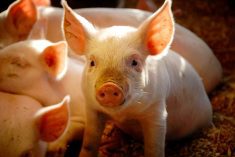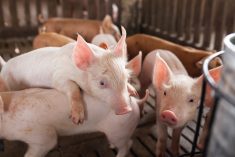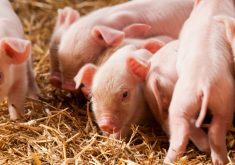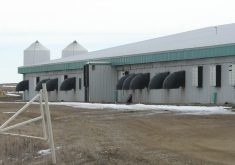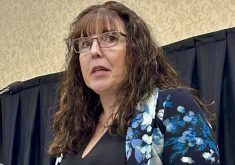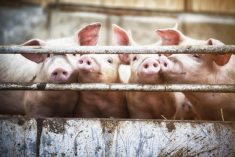Untreated manure is good for the soil, anaerobic digesters are ineffective, hogs will poison Lake Winnipeg, farm expansion has ignored Treaty Land Entitlements and immigration relies on the pork industry.
Those are just a sampling of the varied opinions heard by an all-party committee of the provincial legislature last week during two days of public hearing on Bill 24. Better known as the Red Tape Reduction and Government Efficiency Act, the omnibus bill covers legislation ranging from consumer protection and labour relations, to residential tenancies and transportation of dangerous goods — but it was the proposed changes to hog production that garnered the most attention.
Read Also

Pork’s problems with Livestock Price Insurance linger
Pork producers in Western Canada rarely buy livestock price insurance, citing high premiums as a major obstacle to the non-cost shared business risk management program.
In many cases the issues being raised aren’t even covered by the proposed legislation, industry representatives told the committee.
“Manure does not get into rivers and lakes, in fact it is illegal for manure to leave a field, injecting manure also reduces greenhouse gases and significantly reduces odour,” George Matheson, Manitoba Pork’s chairperson told committee members. “By law, manure management plans with soil test results are filed annually with Manitoba Sustainable Development… these requirements will not change with these proposed amendments.”
Matheson was the first of about 60 registered presenters to speak to the Standing Committee on Legislative Affairs and addressed proposed changes to The Environment Act. If passed, hog producers will no longer have to install pricey anaerobic digesters in order to expand their operations, a cost so prohibitively high it effectively made new barn construction unattainable, the MPC says.
- Read more: Hog production faces opposing ideologies
In a press release issued this spring, the Manitoba government described Bill 24 as removing “general prohibitions from The Environment Act for the expansion of hog barns and manure storage facilities.”
It’s something that the Pork Council’s general manager called long overdue.
Speaking as a private citizen, Andrew Dickson did not mince words. He called the so-called hog barn moratorium brought in under Gary Doer’s NDP government “cynical fabrications of utter nonsense” that sated political rather than environmental concerns.
He continued, adding that “the (Greg) Selinger government recognized that it had been left a rotting corpse and devised a convoluted way around the legislation,” but that the reduction of red tape was what hog producers really needed.
Michael Stainton of the Lake Winnipeg Foundation agreed that anaerobic digesters aren’t the answer to nutrient run-off, but also expressed concerns around the expansion of Manitoba’s hog industry.
“Anaerobic digestion should not be the factor limiting the growth of Manitoba’s hog industry, however, we strongly believe that industry expansion should be limited by the availability of suitable land for manure spreading,” he said. “Currently hog production in Manitoba is very concentrated… because high costs prohibit the long-distance transport of manure, manure spreading on these operations is also very concentrated.”
He noted 35 per cent of the province’s hog operations are located on one per cent of the province’s land.
“The moment we start spreading more manure than crops can use it’s no longer fertilizer, it’s a waste product to be disposed of and as such poses a risk to our water supply.”
If passed, Bill 24 would also decrease the number of infrastructure assessments that public and semi-public water suppliers are required to conduct. Currently, water system infrastructure must be tested every five years, but the Progressive Conservative government is seeking to change the test interval period to 10 years.
It’s a prospect that caused concern for Mike Sutherland who presented to the committee on behalf of Peguis First Nation. He said a potential expansion of intensive livestock operations, coupled with a reduction in oversight, could spell disaster for his community.
“This bill is going to have a negative effect,” Sutherland told the committee. “Peguis floods yearly, it’s at the basin in the north end… south of the basin is all farmland, with a fair share of hog barn operations, Peguis gets its drinking water from the groundwater.”
He added that since the hog-barn moratorium came into effect, there has been a reduction in a number of health issues related to water quality in his community.
But as with many presenters, much of the information presented was anecdotal, something Stainton said points to the root of the problem — a lack of scientific data.
“Without data, industry, government, regulators and concerned citizens cannot accurately quantify the current impact of Manitoba’s hog industry on water quality,” he said. “We just don’t know.”
Bill 24 would also strike the winter manure application ban from the Environment Act, although winter application would continue to be prohibited for all livestock operations in Manitoba under the Livestock Manure and Mortalities Management Regulation.
Several presenters, including Stainton, asked the committee to keep the ban on winter application enshrined in legislation.
“The Lake Winnipeg Foundation urges that Bill 24 be amended so as to not repeal Section 40.2 of the Manitoba Environment Act,” Stainton said, calling it the most important environmental protection afforded Lake Winnipeg in the last two decades. “The ban on winter spreading of all manure should be maintained in legislation, the highest form of protection for Manitoba’s water.”
Finance Minister Cam Friesen responded to concerns about the proposed change by stressing that removing the provision from the legislation was about eliminating “redundancy,” not weakening environmental protections.
“Let me clarify one thing for you, our government has no plans to allow for a change in terms of winter manure spreading,” he told Stainton.
But opposition MLA James Allum pushed back against the assertion.
“What he fails to say is that if it stays in legislation, then he has to come before a committee like this and do proper consultation,” said the representative for Fort Garry-Riverview. “When it’s in regulation, any Wednesday morning at a cabinet meeting, with a stroke of a pen he can get rid of it.”
However, hog producers like Margaret Rempel urged the MLAs to see manure as a resource rather than a waste product.
“Livestock manure is a very valuable resource to me as a farmer,” she said. “As a high-quality, organic fertilizer it provides superior nutrition for growing crops, contributes significantly to the building of healthy soils in the long term and of course is a local product and a renewable product.”
Lyanne Cypres spoke to the hog industry’s ability to build something else all together — community. She came to Neepawa from the Philippines to work for HyLife Foods as a temporary foreign worker. Today, she is a Canadian citizen and said that Neepawa is no longer the “ghost town” it was when she arrived in 2009.
She told the committee she was speaking on behalf of the more than 1,000 immigrants who have come to the small town to work in the industry in the hope of a better life than the one they left behind.
They “had their lives and their family’s lives changed through the pork industry in Manitoba… we are grateful for this chance,” Cypres said. “We would like to see the pork industry flourish.”







